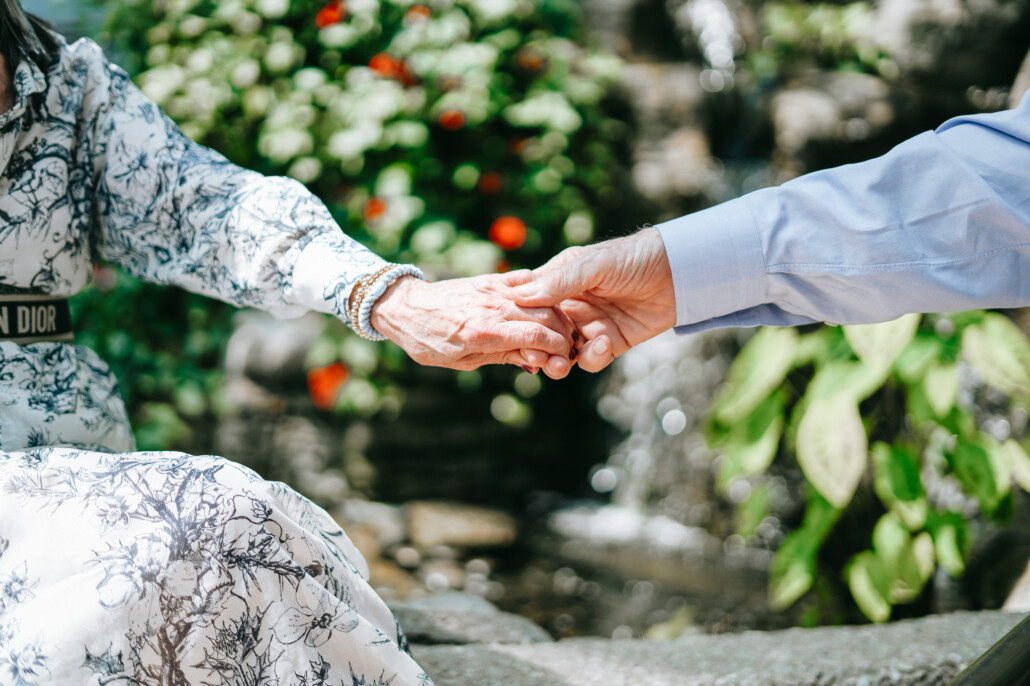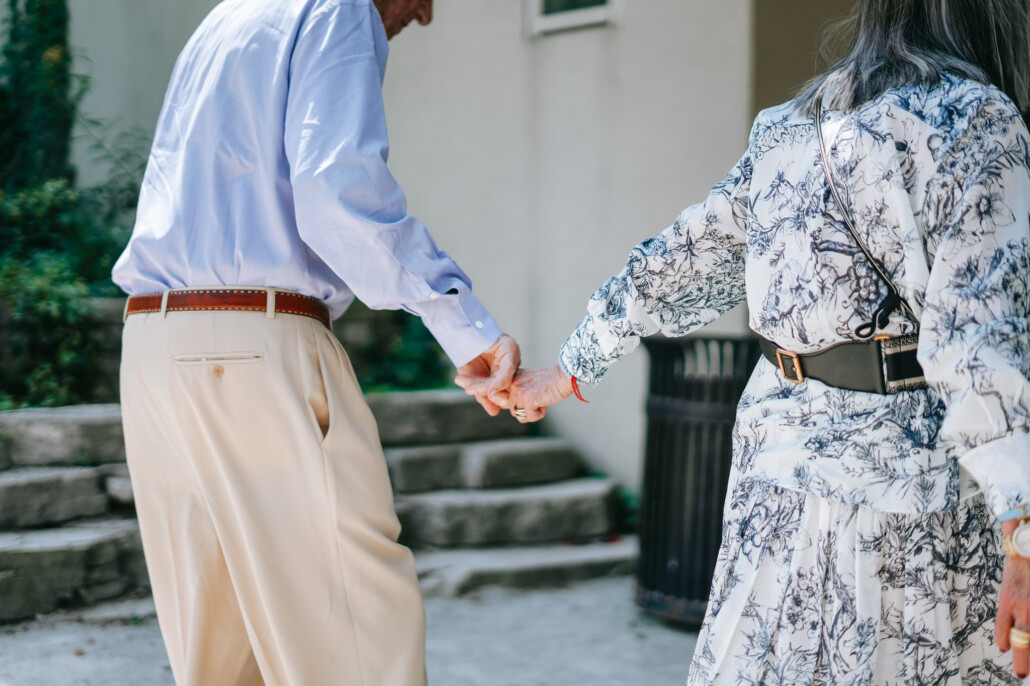Today’s story was written by Andrea Pflaumer, who usually offers us sage style advice for us women over 50. But today, she muses on a topic that I have become all too familiar with over the past year of my life — caregiving. As we age, caregiving needs and challenges can shift, and people of different ages face unique physical and emotional health risks. I’ve recently shared the story of how I felt that my life shrunk when I took on the role of caregiver. Since then, I have written a follow-up detailing how to take joy in solitary pleasures here, as many of you have reached out, and I understand how important this topic is. Read on to get Andrea’s heartfelt (and just plain good) advice on how to care for yourself when you are in a caretaking role.

When caring for your loved ones becomes your primary role in the relationship, it’s imperative that you make time to care for yourself.
When we commit to the person we choose to spend the rest of our lives with, we willingly pledge to do so “in sickness and in health.” What that implies is not fully understood until someone we love suddenly requires our care 24/7. The amount of sacrifice, time, and energy involved is daunting. Whether you are caring for a husband, mother, or aging parents, each relationship brings its own emotional and physical challenges.
Caregiving situations can vary widely, from supporting a spouse recovering from treatment to caring for loved ones with chronic illness, such as Alzheimer’s or Alzheimer’s disease. These illnesses can take a significant toll on both the caregiver and the person receiving care.
I recently spoke with Denise Lampron, the founder of an organization called The Art of Mindful Aging, to ask about maintaining balance in life while caretaking a significant other. (Denise is a psychiatric nurse, helping her life partner as well as carrying the majority of responsibility for her father.) She addressed the subject in several unique ways.
Creating a Third “Entity”
What she explained is that we tend to view a loving relationship as our personal safety net. “We feel that finally, someone will care for us and share our life’s journey. It gives us a standing in the community. We are one part of the relationship, and our partner is the other.”
But she suggests that the relationship itself is a third entity, a container on its own: “It has an aliveness and an awareness and energy to it and if we get quiet and pay attention, we understand what that entity needs. And then we can nourish it and feed it.”
The great advantage of seeing the situation from this angle is that it can lighten the load that caretaking requires. It allows us to continue experiencing the love we feel for the person while experiencing the situation more objectively. As a caregiver, it’s important to recognize and manage your emotions, such as guilt, anger, or sadness, as these emotions can provide valuable signals about your own well-being and stress levels.
Caregiving often involves significant sacrifices and time, and it’s common for caregivers to neglect their own needs or put them on the back burner while focusing on the person they are caring for.
One way to reinforce this is by saying: “Well, let’s see what this (test, doctor’s appointment, rehabilitation exercise, treatment, etc.) is going to show us today.” It lightens up the “charge” around these events. It also helps the person you are caring for to feel less burdensome. Remember, self-care is an important part of being an effective caregiver and helps maintain both your health and the health of the relationship.
Being Honest…Without Spilling Your Guts
Healthy communication is crucial to make that 3rd entity – the relationship – stronger. But knowing both what to say and when to say it are key.
In Denise’s example of how she approaches this she says, “Let’s talk. How was that? What are you concerned about? What do you need from me that I’m maybe not giving you in this context? It opens the discussion about where we are.”
In some cases a caretaker will receive information from a healthcare professional that is not shared with the patient. When this happens, you need courage and discrimination. Say what needs to be said but also recognize what doesn’t need to be said. Talking to a counselor can provide valuable guidance and support for managing the emotional and logistical challenges that come with caregiving.
By examining your own private worries or your own timeline needs, you’ll get a clue about to whether something is helpful or not. It requires pulling back a bit and reminding yourself, “That’s not important, that’s not something that will contribute to their well-being.” Education and training are also important resources for caregivers, helping them develop the skills and knowledge needed for effective communication and care.
Our Relationship With Ourselves
Guilt is often a large part of the caretaking experience. When you are exhausted and feel you can’t take a break the relationship can becomes solely what Denise describes as “obligatory and transactional.”
Maintaining self-care while caretaking someone is not just crucial for you, it actually contributes to the health of the relationship. Think of it like the oxygen mask on an airplane: you need to put on your own oxygen mask first before helping others. “You’re giving them the honor of who you are and what you need…those boundaries actually have a way of giving a healthy structure to the relationship,” Denise adds.
Neglecting your own needs and self-care can lead to chronic stress, which increases the risk of illness, including depression and other health problems, for caregivers.
It’s also important to admit to yourself what you are feeling and then express your feelings respectfully. People may argue about situations but no one can deny how you feel about those situations. It just requires honesty without expressing blame.
The script might be: “Sweetie (or Mom, Dad) you know I love you; I want to do the best I can, but I’m feeling (exhausted, frustrated, overwhelmed, etc.) about the amount of time it takes, (or the energy it requires, the lack of cooperation from the other kids, the rest of the family, whomever it is.) Can we talk about that?”
But it’s one thing to be honest and another to be brutal. My meditation teacher used to always say, “Speak the sweet truth.” Before gently saying “what we need to do now is…” start off difficult conversations with something that is uplifting for the person, something that makes them feel good, loved, and supported. It could be a story about a friend or family member who asked about them. Or it could simply be expressing your appreciation for who they are, for something you have learned from them. It could even be an amusing or heartwarming story on a subject that you know they would appreciate.
Building a Support Network
For many family caregivers, the journey of caregiving can feel overwhelming and, at times, isolating. The weight of caregiving responsibilities—preparing meals, managing medications, providing emotional support, and more—can lead to prolonged stress, anxiety, and even depression if you try to shoulder it all alone. That’s why building a strong support network is not just helpful, but essential for your own health and well-being.
A support network is made up of the people and resources you can rely on for assistance, encouragement, and understanding. This can include family members, friends, neighbors, and community organizations. Many caregivers report that simply having someone to talk to or share tasks with can make a world of difference in their caregiving situation. Whether it’s a friend who listens, a sibling who helps with errands, or a neighbor who offers a meal, these connections help lighten your load and reduce caregiver stress.
Organizations like the Family Caregiver Alliance offer invaluable resources for family caregivers, connecting you with support groups, educational tools, and community services tailored to your needs. Online communities and local support groups can also provide a safe space to share experiences, seek advice, and find comfort in knowing you are not alone.
Don’t underestimate the power of respite care—temporary relief that allows you to take a much-needed break. Whether it’s a few hours to focus on your own needs, catch up on sleep, or simply enjoy a walk, respite care can help prevent burnout and protect your physical and mental health. Remember, taking care of your own care is not selfish; it’s a necessary part of being able to provide the best support for your loved ones.
Self-care strategies like regular exercise, healthy eating, and prioritizing sleep are easier to maintain when you have a support network to share responsibilities. If you’re feeling overwhelmed, reach out to your community, friends, or family members for help. Asking for assistance is a sign of strength and commitment—not weakness.
Building a support network takes time and intention, but it’s one of the most important steps you can take as a caregiver. By connecting with others, utilizing available resources, and prioritizing your own well-being, you’ll be better equipped to manage the stresses of caregiving and maintain a sense of balance and purpose in your life. The future of caregiving depends on strong, supported caregivers—so start building your network today, and remember, you are never alone on this journey.
Rejuvenate Yourself to Be a Better Caretaker

Once you’ve been honest about your feelings and the challenges that caretaking involves you will have opened the door to allow yourself to replenish your physical and emotional energy.
Many caregivers spend dozens of hours per week on caregiving tasks, making it essential to schedule regular breaks and establish weekly routines to manage responsibilities effectively.
So choose something that gives you a mental and physical break. Removing yourself from the physical space where you have the responsibility will help clear your mind. You are not leaving or abandoning the person. You’re simply expanding the space of the relationship’s container.
Caregiving can look different depending on the situation, such as supporting a loved one after a hospital stay, which can bring unique emotional and physical challenges. Exploring community living options can also provide valuable support and respite for both caregivers and their loved ones, offering access to community-based services and social engagement.
Maybe go for a walk in nature while your loved one is napping. Take yourself out to lunch or have tea with a friend who has a supportive ear. Window shopping, getting a hair trim, or a pedicure while your loved one is at an appointment or while someone else has taken over the responsibility for a while can reset your energy level and mindset. Maybe you just need to take a 20-30 minute meditation break or just sit quietly and listen to your favorite music.
There is a special place in Heaven for those who take on the enormous challenge of caretaking. It can be done. And it can be done respectfully, without sacrificing your well-being.
How has your outlook changed since becoming a caregiver? If you are not yet in that position, how has this opened your eyes? Please share in the comments.

Darling, be the first to read every story. Join my email list to have every story delivered to your inbox.
SUBSCRIBE NOW
 Andrea Pflaumer is the author of two books: the Amazon best-seller Shopping for the Real You: Ten Essential Steps to a Perfect Wardrobe for Every Woman: Fashionistas, Fashion-phobes, and the Over 50 and She’s Got Good Jeans – a guide for how to shop for and where to find the perfect jeans for your body and budget.
Andrea Pflaumer is the author of two books: the Amazon best-seller Shopping for the Real You: Ten Essential Steps to a Perfect Wardrobe for Every Woman: Fashionistas, Fashion-phobes, and the Over 50 and She’s Got Good Jeans – a guide for how to shop for and where to find the perfect jeans for your body and budget.
She does in-person and online wardrobe and shopping consultations for women worldwide and blogs at Shopping for the Real You. Her free course, Lazy Person’s Guide to a Perfect Wardrobe is available on GoHighbrow. Andrea hosts two video series: Vital, Vivacious, and Visible after 50 and Shopping for the Real You: Expert Edition. She interviews women in the areas of fashion, beauty and wellness on her Shopping for the Real You YouTube channel. She is a regular contributor to several national and international publications for women over 50 and is presenting an online class this November through the American Institute of Image Consultants.
Come find your supportive community of like-minded women!
🌻 Join Women over 50: Celebrate Visibility
🌼 Join Sisters in Widowhood: Life Transition
🌷 Join Estranged Mothers and Grandmothers: Millions Strong
IF YOU ENJOYED THIS ARTICLE, PLEASE SUBSCRIBE.
YOU WILL GET EVERY AMAZING STORY DELIVERED STRAIGHT TO YOUR INBOX.

+ show Comments
- Hide Comments
add a comment